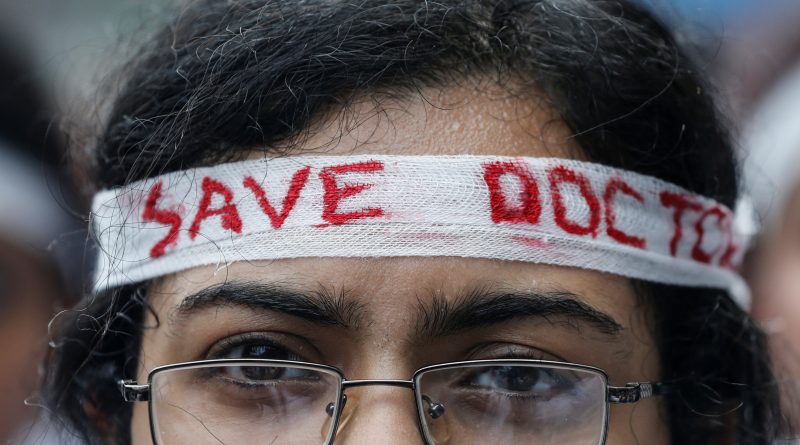Saviours Under Threat
The recent doctors’ strike in West Bengal and the rest of India brought into renewed focus the growing incidence of violence against medical professionals and healthcare establishments and the dire need to root out this malady….
By Amresh Kumar Tiwary
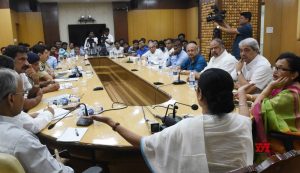 The doctors’ strike that rocked West Bengal and other parts of India in June 2019 was called off after Chief Minister Mamata Banerjee accepted the demands of doctors over providing security measures to the medical fraternity. The strike had begun after the assault on two junior doctors at Nil Ratan Sircar Medical College and Hospital (NRSMCH) in Kolkata following which resident doctors had called for a nationwide strike. The entire medical community expressed solidarity with the resident doctors who were on national strike.
The doctors’ strike that rocked West Bengal and other parts of India in June 2019 was called off after Chief Minister Mamata Banerjee accepted the demands of doctors over providing security measures to the medical fraternity. The strike had begun after the assault on two junior doctors at Nil Ratan Sircar Medical College and Hospital (NRSMCH) in Kolkata following which resident doctors had called for a nationwide strike. The entire medical community expressed solidarity with the resident doctors who were on national strike.
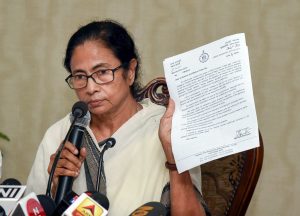
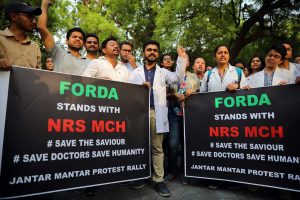
Indian Medical Association (IMA) observed nationwide protest and condemned the violence against the doctors in West Bengal. IMA demanded exemplary action by the state government of West Bengal. It sent an appeal to the Prime Minister and the Union Home Minister and demanded a central Act on violence against doctors and hospitals.
According to IMA, safety and security in the hospitals have been a matter of great concern and need to be addressed and ensured. In view of the continued sufferings of the medical professionals and health workers as well as repeated occurrence of such incidents without redressal, all associations of the fraternity joined the struggle. IMA demanded a national law against hospital violence.
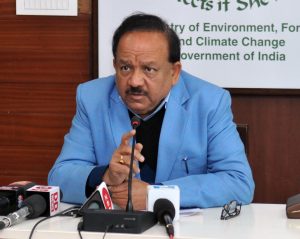
Dr. Harsh Vardhan, Union Minister for Health and Family Welfare expressed concern at the growing incidence of violence against doctors. Strongly condemning the violence, he said that it was necessary and important for the doctors to get a safe work environment. He stated that he would take this matter up with all Chief Ministers so that such incidents can be avoided in the future. He had met a delegation of Resident Doctors Association of AIIMS, Safdarjung Hospital, Dr. Ram Manohar Lohia Hospital, United Resident & Doctors Association of India (URDA) and Federation of Resident Doctors Association (FORDA), who gave a representation to him on the violence against doctors in West Bengal. He assured them his support and cooperation.
“Doctors are an integral pillar of the society and often work under stressful and difficult conditions. I urge the patients and their caregivers to observe restraint”, Dr. Harsh Vardhan stated. He also urged the doctors to observe restraint so that essential services to the people are not disrupted.
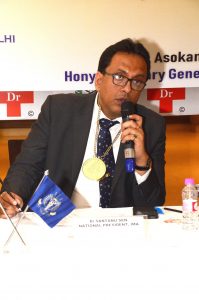 Dr Santanu Sen, National President, IMA, observed, “We have declared a zero-tolerance policy against violence on doctors and healthcare establishments. The World Medical Association has also passed a resolution against violence on healthcare establishments and urged to bring stronger legislation against this menace. National law against violence on hospitals has to be brought in urgently. The law should provide a minimum of seven years imprisonment for hospital violence. To ensure that the cases are registered, culprits are arrested and conviction is necessitated, appropriate mandatory provisions as provided in the POCSO Act have to be instituted.”
Dr Santanu Sen, National President, IMA, observed, “We have declared a zero-tolerance policy against violence on doctors and healthcare establishments. The World Medical Association has also passed a resolution against violence on healthcare establishments and urged to bring stronger legislation against this menace. National law against violence on hospitals has to be brought in urgently. The law should provide a minimum of seven years imprisonment for hospital violence. To ensure that the cases are registered, culprits are arrested and conviction is necessitated, appropriate mandatory provisions as provided in the POCSO Act have to be instituted.”
“Hospitals should be declared as safe zones and provision of appropriate security should be the responsibility of the state. Violence in hospitals will adversely affect the patient care. Not only are the patients undergoing treatment in the institution but there are several other indirect consequences. Institutions will be reluctant to take up complicated and risky patients which will affect critical care. Threat of violence increases the stress levels of healthcare workers. Sound judgment regarding patient care will be compromised in such situations. Patient Care and safety depend on peaceful ambience in the hospitals.”
Dr R V Asokan, Honorary Secretary General, IMA, said, “In the recent past, there have been various cases of violence on doctors and hospitals in many states. The gruesome incident in NRS Medical College, Kolkata is of barbaric nature. Dr Paribaha Mukharjee who was brutally attacked was critical and fought for his life. We condemn the violence perpetrated on a young doctor. The entire medical fraternity expresses our solidarity with the residents who were on strike. We emphatically demand Central Act on violence.”
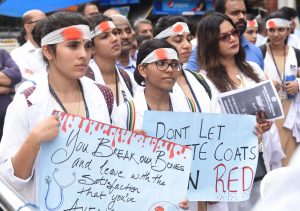 In view of the recent assault on doctors in West Bengal, Dr Harsh Vardhan wrote a letter to the Chief Ministers of all States and UTs drawing their attention for strict action against any person who assaults doctors. Expressing deep concern over the recent acts of violence against doctors, the Union Health Minister stated that incidents of assaults on doctors are reported from different parts of the country and this leads to sudden strike by doctors, gravely affecting the healthcare services.
In view of the recent assault on doctors in West Bengal, Dr Harsh Vardhan wrote a letter to the Chief Ministers of all States and UTs drawing their attention for strict action against any person who assaults doctors. Expressing deep concern over the recent acts of violence against doctors, the Union Health Minister stated that incidents of assaults on doctors are reported from different parts of the country and this leads to sudden strike by doctors, gravely affecting the healthcare services.
Representatives from the IMA and Delhi Medical Association (DMA) called on Dr Harsh Vardhan. Stressing further on the need for avoiding such incidents in future, he said that the law enforcement should prevail so that doctors and clinical establishments discharge their duties and professional pursuit without fear of any violence. “Strict action against any person who assaults them, must be ensured by law enforcement agencies,” he emphasized.
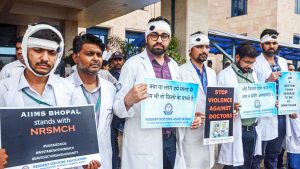 The IMA has raised this concern many a time. Since ‘police’ and ‘public order’ are State subjects, Government of India, on many occasions has drawn attention of state governments for an urgent need for a robust criminal justice system with emphasis on prevention and control of crime. A copy of the Draft Act i.e. “The Protection of Medical Service Persons and Medical Service Institutions (Prevention of Violence and Damage or Loss of Property) Act, 2017 provided by IMA was also circulated to the States vide the 2017 letter. The draft Act includes clauses on penalty and recovery in case of loss/damage to property. Dr. Harsh Vardhan has reminded the Chief Ministers and requested them to consider enacting specific legislation for protecting doctors and medical professionals, and has forwarded the Draft Act provided by IMA.
The IMA has raised this concern many a time. Since ‘police’ and ‘public order’ are State subjects, Government of India, on many occasions has drawn attention of state governments for an urgent need for a robust criminal justice system with emphasis on prevention and control of crime. A copy of the Draft Act i.e. “The Protection of Medical Service Persons and Medical Service Institutions (Prevention of Violence and Damage or Loss of Property) Act, 2017 provided by IMA was also circulated to the States vide the 2017 letter. The draft Act includes clauses on penalty and recovery in case of loss/damage to property. Dr. Harsh Vardhan has reminded the Chief Ministers and requested them to consider enacting specific legislation for protecting doctors and medical professionals, and has forwarded the Draft Act provided by IMA.
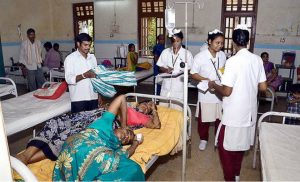 Undoubtedly, doctors form an important pillar of society and often work under stressful and tough conditions. Our doctors rank among the best in the world and work for long hours under harsh conditions, grappling with a huge load of patients. It is the duty of the states to ensure safety and security of doctors so that the healthcare needs of the society are met.
Undoubtedly, doctors form an important pillar of society and often work under stressful and tough conditions. Our doctors rank among the best in the world and work for long hours under harsh conditions, grappling with a huge load of patients. It is the duty of the states to ensure safety and security of doctors so that the healthcare needs of the society are met.
_________________________________________________________________________________
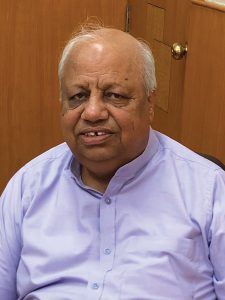 What ails healthcare system
What ails healthcare system
A recent study by IMA reports that 75 per cent of doctors in India have faced violence at some point of time in their life, and most of the time, it is verbal abuse. There is no reason to wait now to stop this violence against doctors and take preventive measures. Violence against doctors or other medical fraternity hardly made any news, or hardly there was discussion about this in India in medical journals about a decade back as they were probably infrequent though such violence in western countries was known. In the majority of the cases (60-70%), such violence took the form of either verbal abuse or aggressive gesture. Very often, those who abused a medical person were patients themselves who were under the influence of alcohol and drug and were delirious or were in the psychiatry wards. Increased risk of violence was also recorded when a general physician was on house calls, particularly at night.
One of the important dimensions of violence to the doctors in government and corporate hospitals is the feeling of wrong doing by the doctors for financial gain or for avoiding his/her duties. Anxiety, long waiting period before the patient could speak to a doctor and the feeling that doctor is not giving enough attention to his/her patients engender frustration giving rise to violence. Majority of the hospitals in India do not have good grievance reddressal system in place. Legal procedures in India also take inordinately long time.
Dr A K Agarwal, Medical Director (Innovation), Apollo Group of Hospitals, New Delhi and Ex-President, Delhi Medical Council, said, “For government hospitals and primary health centres across the country, particularly in West Bengal and Maharashtra, violence by patients’ relatives, local goons, and political leaders and even by police has been reported. Here, money is not the reason but anxiety, long waiting period, non-availability of crucial investigations, inordinate delay in referral, unhygienic and extremely crowded condition in the emergency and other wards are some of the reasons.”
Now, what can be done to reduce the violence against doctors? If we look at the classification of patient violence in our country, most of the time, the violence refers to verbal abuse, vandalism and physical threat; most of the other forms of violence are yet to come to our society. “However, the most important difference in violence as is seen in western countries is how quickly the verbal abuse becomes physical assault and vandalism and how rare it is that other patients and their relatives or third party make no efforts to stop it,” he added.
_________________________________________________________________________________
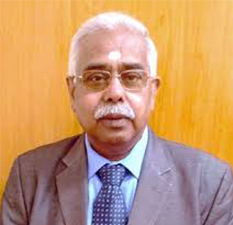 Learning and Unlearning in Kolkata…
Learning and Unlearning in Kolkata…
By Dr R V Asokan
13th June 2019 will always be etched in my memory as the proudest day in my life. Battered and haggard, the young Residents fought a literal war with the might of a Government known for its high handedness. They fought for the dignity of the profession. They were the foot soldiers of modern medicine. When all odds were against them, they dug their heels for future generations of doctors. The relentless fight back in our medical colleges against the unprecedented violence is nothing but the freedom struggle of the profession. There they were all over the campus refusing to be cowed down. These little giants were made of grit and will in Richter scale. Fearless and selfless they had the capacity of collective wisdom and leadership. What all one needed to do was to step back and allow them to be their own. This we did in ample measure.
We carried to them the moral strength of the entire fraternity. They carried the burden of our expectations. They stood like a rock against all dividing forces. They lived to fight another day. We will never go home until you are safe. We are learning leadership from you. The youth of medicine have come of age. Our humble unlearning of our apprehensions of the future have been answered. Baton has changed hands. You can rest on our shoulders. Welcome to our second home: the IMA. We are a family. Hand in hand we will fight this war through darkness to dawn.

